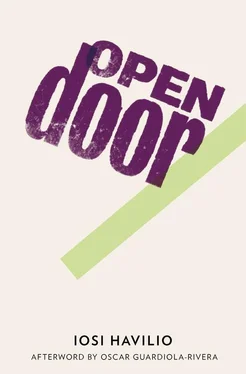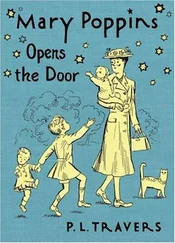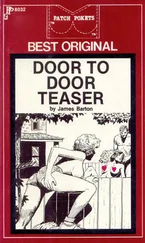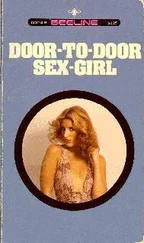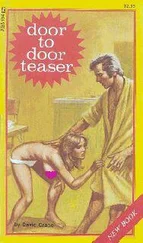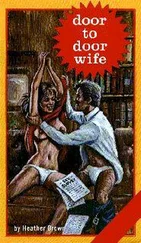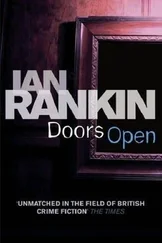Iosi Havilio - Open Door
Здесь есть возможность читать онлайн «Iosi Havilio - Open Door» весь текст электронной книги совершенно бесплатно (целиком полную версию без сокращений). В некоторых случаях можно слушать аудио, скачать через торрент в формате fb2 и присутствует краткое содержание. Год выпуска: 2013, Издательство: And Other Stories, Жанр: Современная проза, на английском языке. Описание произведения, (предисловие) а так же отзывы посетителей доступны на портале библиотеки ЛибКат.
- Название:Open Door
- Автор:
- Издательство:And Other Stories
- Жанр:
- Год:2013
- ISBN:нет данных
- Рейтинг книги:4 / 5. Голосов: 1
-
Избранное:Добавить в избранное
- Отзывы:
-
Ваша оценка:
- 80
- 1
- 2
- 3
- 4
- 5
Open Door: краткое содержание, описание и аннотация
Предлагаем к чтению аннотацию, описание, краткое содержание или предисловие (зависит от того, что написал сам автор книги «Open Door»). Если вы не нашли необходимую информацию о книге — напишите в комментариях, мы постараемся отыскать её.
Iosi Havilio
Open Door
Open Door — читать онлайн бесплатно полную книгу (весь текст) целиком
Ниже представлен текст книги, разбитый по страницам. Система сохранения места последней прочитанной страницы, позволяет с удобством читать онлайн бесплатно книгу «Open Door», без необходимости каждый раз заново искать на чём Вы остановились. Поставьте закладку, и сможете в любой момент перейти на страницу, на которой закончили чтение.
Интервал:
Закладка:
‘I’d better lend you some clothes, or you’ll catch cold straight away,’ she said and undertook to undress me herself. First my boots, then my trousers, blouse and the rest.
‘Are you cold?’ asked Eloísa and, again, didn’t let me answer. She wrapped me in the towel and stared at me. Then, first with one hand, then with both, she began to touch my breasts, without asking my permission. Making circles, squeezing them, pinching my nipples, she played, she enjoyed herself.
Then Eloísa turned on the television again and we ate an enormous bag of crisps, watching a quiz show. The rain continued to fall hard. There was no sense in thinking about going back.
Night fell and tiredness pushed us into bed. Without meaning to we embraced. Eloísa fell asleep immediately. I took a bit longer. On my back, with Eloísa’s hair covering half my face, my head fills with green things that skim past quickly, green flashes of lightning, images, abstractions. They are strange yet agreeable shapes. Eloísa smells so good.
I open my eyes at some point in the early hours. Somewhere between surprised and scared. After the rain, it has become intensely cold. I have to go back. Before I leave, Eloísa, pretending to be asleep, gives me a long kiss on the mouth.
I arrived at the house with my trousers muddied up to the knees. From the gate, I could see more lights than usual and I knew that Jaime was waiting up for me. He was in the kitchen, his arms folded, his eyes beginning to close. He didn’t even have the strength to ask me what had happened, but I told him anyway. I told him that I’d been trapped by the rain. Jaime couldn’t accept that Eloísa’s phone didn’t work when his functioned perfectly.
‘You can’t do this,’ he was saying. ‘You should have let me know somehow. I was thinking about calling the police.’ He was exaggerating.
EIGHTEEN
How do I know that guy sitting on a bench next to the pergola with sunglasses and a can of Coke in his hand? I can’t remember. He’s a normal-looking guy, the kind you see everywhere. I know him from somewhere though.
Jaime parks the pick-up to one side of the kiosk.
‘Come on,’ he says, ‘I’m going to show you something.’
Jaime gives me a brief tour of the hospital facilities: the bakery, the power plant, the various workshops for shoes, textiles and carpentry, but the thing that Jaime really wants to show me is the road that leads to the nursery, his place of work. It’s incredible, I say, quite sincerely. At night, explains Jaime, it’s pitch black. He also shows me the houses for permanent staff and the play park. It’s a little village inside another.
Now Jaime hurries because he has some business to discuss in the office and it’s nearly one o’clock, lunch hour. I follow him. We circle the pergola again and that man, who continues to intrigue me, is still there, his back to me. He doesn’t see me; there’s no way to find out who he is.
Jaime heads towards the door where I dropped off his papers the last time, but he carries on and raps his knuckles against a glass window at the side. A head appears immediately, the same girl whose style had confused me before, but with an unexpected addition: a ring in her nose. Jaime introduces us and she no longer disconcerts me once I find out that her name is Laica. Jaime tells Laica about my interest in the history of Open Door. It’s an idle comment, unnecessary. Laica smiles without saying anything. I feel uncomfortable.
The midday sun hits my forehead, stunning me. I descend the stairs, facing the pergola. The loony bin is at my feet and I’m a bit like a tourist fresh off the train, who leaves the station and begins to discover a new city whose buildings, trees and streets convey the illusion of time stood still: the historic centre, the main square, the town hall, the church, the houses, and its people. I get a bit lost. I’m a new arrival. I skirt the roundabout and head down an endless road with a crowd of ancient eucalyptus on either side. I’m taking a bit of a chance. In the distance, two silhouettes are advancing rapidly towards me. They get bigger. I retrace my steps.
I take some more turns and come out at the back of the sports courts, where the inmates play pelota paleta . All these trees are making me dizzy, I need a rest.
I buy cigarettes at the kiosk next to the office, I smoke and feel calmer. Jaime must be about to come by to look for me, he said two o’ clock. Despite being a rural type, he’s quite punctual.
Suddenly I get the feeling that someone is speaking to me, it must be him. No, it’s the man with the sunglasses and Coke. Yes, now I recognise him, but it makes no sense. It’s Yasky, the court clerk, in flesh and blood, a mere five metres from where I’m standing, masked by those old-fashioned motorcycle sunglasses, too bulky for the size of his face, which make him look ridiculous, a cross between a fly and a premature baby. Without his suit, he’s unrecognisable. But what’s he doing here? Why didn’t he summons me if he wanted to see me? I don’t understand. The first thing that springs to mind is that there must be some outstanding legal matter, that I didn’t tell the whole truth and a single word clouds my eyes: perjury. Then my memory clears, of giving the statement in the police station, the pitted face of the obese, gum-chewing officer who spoke into his walkie-talkie as he typed at the computer, and my statement at the court with Yasky’s legs kicking me under the desk, and me, I SWEAR, in capital letters, and I sign at the bottom, here, and here as well, and it’s true, I confess, I did keep some things to myself, things that, well, by now I don’t even know how they really happened. I’ll tell him anything he wants, but he doesn’t give me time. He approaches. Yasky stops half a metre away, takes off his sunglasses and holds out his sweaty hand, which I take in mine. I’m trembling, noticeably. What a surprise, I manage to say. And him: yes, what a coincidence. He’s shaking even more than I am. It doesn’t look like he’s here to arrest me. I’m not in front of Yasky the court clerk, it’s something else, I can see it in his eyes, slightly watery and shrunken, which barely look at me, only as long as they have to, then immediately they dart away, looking at the sky, the ground, an emergency exit, any which way. I calm down. I’m living nearby, behind the hospital, I say gesturing vaguely at somewhere far away. Yes, of course, he says. He talks and every so often he glances to either side, searching. And the business with Aída, no news? I ask quickly, to take the weight off my shoulders. Yasky seems lost, he’s not listening, he’s looking around. My friend, the one from the bridge. Yes, a very unusual case, the coastguard aren’t getting anywhere, or even worse, they find … the thing the other day, for example … and he doesn’t finish the sentence because this time his searching eyes find something: two loonies. One with long hair, regulation blue shirt and trousers, barefoot. The other, in a white t-shirt with a photo of a sailing boat on the front, is, paler and unkempt, a carbon copy of Yasky: the same round face, the classic bearing, the short neck, hairy, neither fat nor thin, a lunatic version of Yasky. They approach and stop a few metres away, taking me in from a distance, heads bowed.
‘This is Julio, my brother,’ says Yasky and widens his eyes for me to say my name.
Now Julio speaks, talking to his brother.
‘This is Omar … I told him to come along so you could meet him … no, he won’t speak to you, he understands but he doesn’t speak, I told him you were here and that we should come and see you … can we have another Coke?’
Omar is somewhere else, he’s inoffensive. He blinks more than is normal, and when his eyes close, he tries to fight it.
Читать дальшеИнтервал:
Закладка:
Похожие книги на «Open Door»
Представляем Вашему вниманию похожие книги на «Open Door» списком для выбора. Мы отобрали схожую по названию и смыслу литературу в надежде предоставить читателям больше вариантов отыскать новые, интересные, ещё непрочитанные произведения.
Обсуждение, отзывы о книге «Open Door» и просто собственные мнения читателей. Оставьте ваши комментарии, напишите, что Вы думаете о произведении, его смысле или главных героях. Укажите что конкретно понравилось, а что нет, и почему Вы так считаете.
